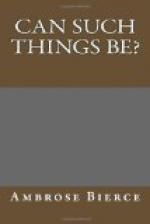II—WHEN YOU HAVE LOST YOUR LIFE CONSULT A PHYSICIAN
Dr. Stilling Malson, of Murfreesboro, having visited a patient six or seven miles away, on the Nashville road, had remained with him all night. At daybreak he set out for home on horseback, as was the custom of doctors of the time and region. He had passed into the neighborhood of Stone’s River battlefield when a man approached him from the roadside and saluted in the military fashion, with a movement of the right hand to the hat-brim. But the hat was not a military hat, the man was not in uniform and had not a martial bearing. The doctor nodded civilly, half thinking that the stranger’s uncommon greeting was perhaps in deference to the historic surroundings. As the stranger evidently desired speech with him he courteously reined in his horse and waited.
“Sir,” said the stranger, “although a civilian, you are perhaps an enemy.”
“I am a physician,” was the non-committal reply.
“Thank you,” said the other. “I am a lieutenant, of the staff of General Hazen.” He paused a moment and looked sharply at the person whom he was addressing, then added, “Of the Federal army.”
The physician merely nodded.
“Kindly tell me,” continued the other, “what has happened here. Where are the armies? Which has won the battle?”
The physician regarded his questioner curiously with half-shut eyes. After a professional scrutiny, prolonged to the limit of politeness, “Pardon me,” he said; “one asking information should be willing to impart it. Are you wounded?” he added, smiling.
“Not seriously—it seems.”
The man removed the unmilitary hat, put his hand to his head, passed it through his hair and, withdrawing it, attentively considered the palm.
“I was struck by a bullet and have been unconscious. It must have been a light, glancing blow: I find no blood and feel no pain. I will not trouble you for treatment, but will you kindly direct me to my command—to any part of the Federal army—if you know?”
Again the doctor did not immediately reply: he was recalling much that is recorded in the books of his profession—something about lost identity and the effect of familiar scenes in restoring it. At length he looked the man in the face, smiled, and said:
“Lieutenant, you are not wearing the uniform of your rank and service.”
At this the man glanced down at his civilian attire, lifted his eyes, and said with hesitation:
“That is true. I—I don’t quite understand.”
Still regarding him sharply but not unsympathetically the man of science bluntly inquired:
“How old are you?”
“Twenty-three—if that has anything to do with it.”
“You don’t look it; I should hardly have guessed you to be just that.”
The man was growing impatient. “We need not discuss that,” he said; “I want to know about the army. Not two hours ago I saw a column of troops moving northward on this road. You must have met them. Be good enough to tell me the color of their clothing, which I was unable to make out, and I’ll trouble you no more.”




